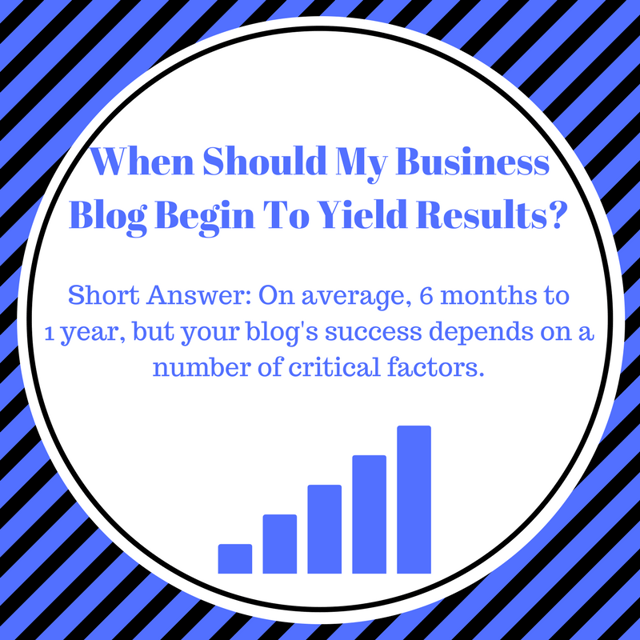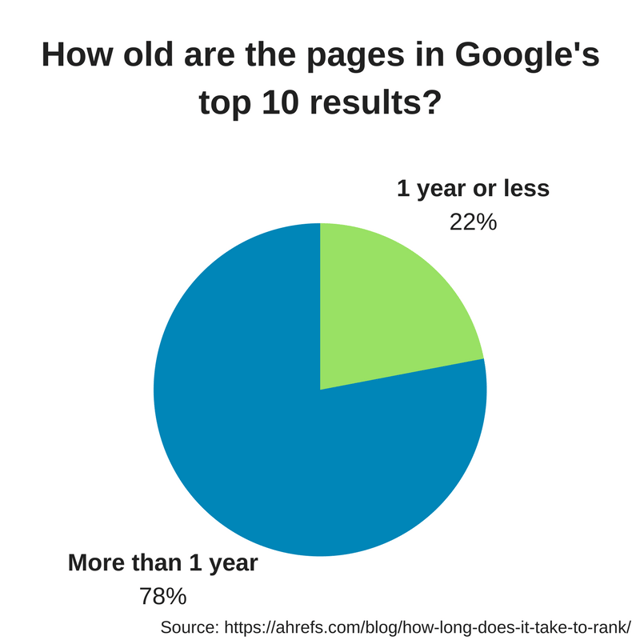Get in shape.
Reduce stress.
Sleep 8 hours each night.
In the weeks following January 1st, you’ve probably seen these popular New Year’s resolutions posted on social media by people eager to see a transformation. If someone’s resolution is to reduce stress and they put in effort to do so, whether that’s practicing deep breathing or mindful meditation, they almost certainly will see the desired results – with time.
Likewise, if you’ve invested in content development for your business blog and you’re following best practices, you will see results in the form of site visits, page interactions, subscribers, shares and conversions – but exactly when will you begin to see these results?
It’s not an unreasonable question. Content writing services can be expensive, and blogging for business requires a lot of upfront faith in the power of content marketing. If you’re thinking about purchasing content development services in order to attract new customers and spread brand awareness, you’re almost certainly going to want to know when you should expect to see a return on investment.
This is when I’m supposed to ask if you’d rather hear the short or long answer. Here are both versions, just in case:
Short Answer: 6 months to 1 year is the rule of thumb. According to HubSpot and other marketing gurus, no matter what industry you’re in, you should start to see your defined KPIs (key performance indicators) yield positive results around the 6-month mark.
Long Answer: It greatly depends on a number of critical factors. It’s important to remember that you’re accountable for your own success or failure. Successful business blogs achieved success because they produced great content, optimized for SEO and didn’t give up. It’s naïve to expect overnight success.

Inbound marketing requires a serious time commitment. It’s not enough to just budget for 1 or 2 months of content development. If you’re serious about seeing results and having your business blog rank on Google, you need to budget for at least 1 year.
On top of having realistic expectations for when you should see results, it’s important to understand what factors influence the timing of your business blog’s success. Here are a few questions to keep in mind throughout the process:
1. How New Is Your Business Blog?
Brand-new websites start off with a DA (Domain Authority) ranking of 1 on a scale which ranges from 1 to 100. Moz defines Domain Authority as “a search engine ranking score developed by Moz that predicts how well a website will rank on search engine result pages (SERPs).” The higher the DA score, the more likely it is that the website will rank on Google and other top search engines. Top business blogs that make it to Google’s top 10 results generally have a high DA score, since Google rewards authoritative sites that are well established.
To back up this notion, Ahrefs conducted a case study, where they took 2 million random keywords and pulled data on the top 10 Google ranking pages for each keyword. Their results found that:
- Only 22% of the pages in Google’s top 10 were created within the past year
- The average page in Google’s top 10 was 2 years old
- The average page that held Google’s number 1 position was 3 years old
Based on this data, most brand-new business blogs aren’t ranking right away. It takes time to build up enough site authority to grab the attention of Google’s crawlers. If you’re just starting your business blog today, it will take more time for it to rank than if you had already been purchasing content writing services for the past several months.

2. How Competitive Is Your Industry’s Content Writing?
Before you begin blogging, it’s essential that you familiarize yourself with your industry’s content landscape. Check out your competitors – do they have active blogs? How often are they posting to their blog if they do? The more content written about your industry, the more difficult it is to have your own industry-specific content rank.
There’s no need to throw up your hands in despair if you’re in an industry that’s written about frequently – this just means it will probably take your business blog longer to yield results since there’s more direct competition.
The good news is there are still plenty of industries that don’t blog often, or at all, meaning they present very low competition to anyone trying to gain traction in that space. Manufacturing, food service, electrical, maintenance and many other blue-collar industries fall into the low-competition bracket, so small business blogs in one of these industries will probably see results much faster.
3. How Much Content Do Your Content Writers Produce?
- 67% of content writers who blog at least once a day report strong results.
- 1,142 words is the average length of a blog post now. Half as many content writers are writing blog posts that are less than 500 words compared to 4 years ago.
The above data was pulled from research compiled by HubSpot, and based on this data we can draw the following inferences:
- The more often you post to your business blog, the better the results will be.
- The lengthier your blog posts are, the better the results will be.
Your content development efforts hinge upon how often you’re publishing content to your site and how well-written and comprehensive that content is. If you’re only posting content to your blog once a month, it’s going to take much longer for you to see results than if you were posting content several times a week.
The answer to the question, “how long will it take for my business blog to yield results?”, is directly affected by the 3 factors outlined above, and because of this, the answer will vary from blog to blog. Successful business blogs didn’t stumble onto Google’s first page by luck, they got there due to consistent effort.
If you’re partnered with a content development agency, but it’s been over a year and you still haven’t seen any measurable results, it may be time to end the relationship and start anew. Consider our monthly content creation packages. When you purchase one of our packages, you can be assured that every piece of content you receive is written by expert writers who understand what it takes to make it to Google’s top 10.






